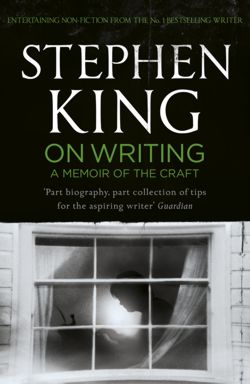
Now, if there’s someone you’d trust to teach you about writing, it's the guy who brought us "Cujo", the lovable Saint Bernard that went on a rabid rampage. That's the type of out-of-the-box, grimly humorous thinking that brought us here today, gathered around our screen-lit campfires, preparing to explore the labyrinthine mind of the one, the only, Stephen King.
In "On Writing", the master of horror himself dons the professor's hat (think less tweed, more barbed wire). The book combines an autobiography, writing guide, and self-help book. Sort of a ‘Buy One, Get Two Free’ deal.
So buckle up dear reader, because we're off to the literary equivalent of a thrilling roller-coaster ride through a haunted house.
Is "On Writing" Scary? Yes, but Not in the Usual Way
Brace yourselves; it's not the gory, spine-chilling horror we're accustomed to with King. No, the real horror here is in facing the sobering truth about the grueling, sometimes torturous, but ultimately rewarding journey of being a writer.
One of the more horrifying revelations in "On Writing" is that writing, *gasp*, requires work. As King puts it, "Amateurs sit and wait for inspiration, the rest of us just get up and go to work." Don't you just love that slap in the face? Yes, folks, believe it or not, writing a novel isn't as simple as waiting for a unicorn of inspiration to grace you with its magical presence. But then again, if unicorns did exist, would we really be sitting around writing books?

The Toolbox and the Shovel (Metaphor Alert!)
In King’s view, every writer needs a toolbox. In it, you should have everything from the basics, like vocabulary and grammar (and no, they’re not as boring as they sound) to the more complicated stuff like theme and symbolism. And yes, folks, King even includes a shovel for when your plot decides to bury itself six feet under. (Okay, maybe he didn't say that, but it’s certainly implied, right?)
Life Lessons and Horrifying...Adverbs?
King also gives some advice that applies not just to writing, but to life in general. Remember that bit about hard work? Apply that to everything, folks. Looking to lose weight? Hard work. Want to learn to play the guitar? Hard work. Trying to understand why anyone thought "Cats" would make a good movie? Even harder work.
Also, according to King, adverbs are the devil's playground. The way he detests those "-ly" words, you'd think they were characters in one of his novels, plotting to take over the world. So next time you think about using one, just remember: 'adverb today, haunted manuscript tomorrow.'
A Surprise Twist: The Master is Human!
Perhaps the most shocking revelation is that Stephen King is...human. His life wasn't a non-stop joyride on the 'success express'. It was messy, complicated, full of rejection, and at times, almost unbearable.
And yet, despite all that, he kept writing. (He also kept drinking, but that's another story, and he does talk about it quite candidly). King likens his love of writing to his past addiction to alcohol: it's a compulsion, a necessity, a lifeline.
So, if you ever find yourself in a liquor store, remember that you can always use that bottle of whiskey to fuel your literary dreams, instead of your liver (Note: This is a joke. Please write responsibly).
Musings on King's Masterpiece: "On Writing"
If you're looking for a book about writing that’s stuffed with stiff academic jargon and pretentious Latin phrases, you're out of luck here. "On Writing" is like having a heart-to-heart with your buddy who just happens to be a literary genius. The one who, in between gulps of beer, says things like "The adverb is not your friend." It's oddly comforting and profoundly terrifying at the same time.
In the end, "On Writing" serves as an open window into the writer’s mind. And not just any writer, but Stephen King, the guy who makes nightmares for a living. King’s book, with all its raw honesty, unfiltered advice, and rugged charm, is like a beacon for those of us wandering aimlessly in the sea of creative confusion.
So, my aspiring author friends, next time you sit down to pen your masterpiece, take a page out of King's book (literally). Stare that blank page in the eye, summon your bravest voice, and whisper, "Once upon a time..." Then, get to work. Because as King reminds us, "Talent is cheaper than table salt. What separates the talented individual from the successful one is a lot of hard work."
And remember: Be scared of adverbs, not of writing.